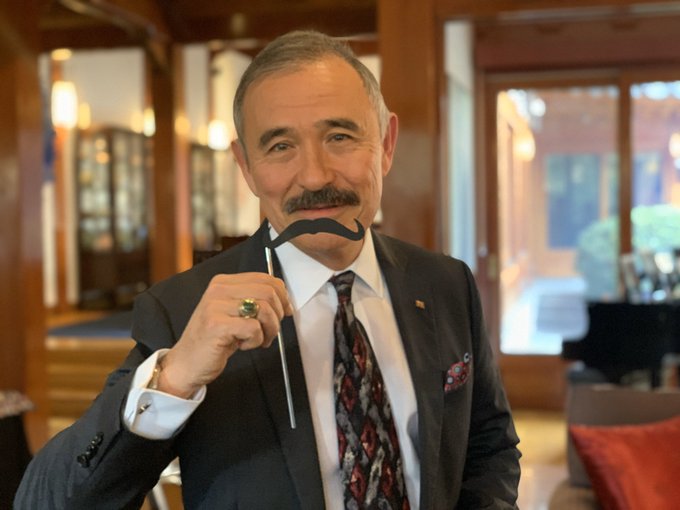A Tempest in a Moustache
"My moustache, for some reason, has become a point of some fascination here."
"I have been criticized in the media here, especially in social media, because of my ethnic background, because I am a Japanese-American."
U.S. Ambassador to South Korea, Harry Harris Jr.
"Harris's mother is Japanese."
"It feels like that alone is enough for us to dislike him."
"Which side will he choose if he is asked to choose between South Korea and Japan?" (America)
Internet blogger, South Korea
"The moustache has become associated with the latest U.S. image of being disrespectful and even coersive toward Korea."
"Harris often has been ridiculed for not being an ambassador but a governor-general."
Korea Times
 |
Resentment and prejudice go both ways. The Japanese, an outwardly courteous and kind people, consider Koreans inferior to the Japanese. Which is in and of itself not all that unusual, from the ancient Greeks who considered themselves superior to all others, to Nazi Germany, to Americans themselves preoccupied with themselves to the exclusion of interest in other countries, it is human nature to elevate one's own and think unkindly of others.
In Japan, generations of Koreans hide their origins by posing as Japanese, changing their names and becoming loyal Japanese citizens, hoping to be viewed as equals. Japan is obsessed with its racial purity and favours no square pegs for its round-holed citizenry. Like China, it deplores restlessness and appreciates calm and serenity. Conformity is culturally obligatory; no one is meant to make a fuss. The more people resemble one another, the better.
The history of Japanese invasion and occupation and brutal behaviour in Korea and China has left both countries embittered and resentful against Japan for its unforgivable atrocities and the suffering of the Chinese and Koreans under its iron fist. The issue of Korean 'comfort women', of occupation, enslavement and violence in both countries is not easily forgotten nor forgiven. Japan's role in the Second World War condemned it to a purely 'defensive' military up to the last few years.
Japanese suffering during World War II after Japan bombed Pearl Harbour forcing the United States to enter the conflict saw its citizens after the nuclear bombing of Nagasaki and Hiroshima, so averse to conflict that members of its military never wear military uniforms in public; they would travel to work at defence headquarters in civilian clothing, and change into their uniforms once arrived at their place of work, and do the reverse to return home.
The U.S. Ambassador is a retired navy admiral who was born in Japan in a union between a Japanese woman and an American naval officer. South Koreans view his moustache as an assault on their sensibilities, reminiscent of Japanese governors-general who ruled Korea from 1910 to 1945 who wore facial hair. Ambassador Harris was named ambassador to Seoul in 2018 and grew his moustache in reaction to having been clean-shaven for most of his naval career.
Despite the close diplomatic and government ties between the U.S. and South Korea linked to the separation between it and the aggressive communist North Korea, with the U.S. presence guaranteeing South Korean protection against the North's sabre-rattling threats, there has been a rift of late. With Ambassador Harris's appointment considered a slight imposed by President Trump in view of strained relations between Japan and South Korea, another issue of wealthy South Korea assuming responsibility in financing the U.S. troop presence has become another irritant.
One that Ambassador Harris has continually put forward as long overdue. South Korea's decision to abandon a military intelligence-sharing agreement with Japan considered important by the U.S. in guarding against China and North Korea has also become a point of irritation, with the ambassador zealously pushing for a reversal of that decision. These are issued that led to the impression of an overbearing American ambassador, whose presence is doubly offensive to the Koreans.
For his part, Mr. Harris responds that growing a moustache was not only popular in the West but in the early 20th Century even among Korean leaders who fought for liberation from Japan, wearing a moustache had become common. He has no plans for the immediate future to remove the facial hair that celebrated his retirement from the U.S. navy. Which realistically dramatically reduces his effectiveness as a diplomat in the nation to which he has been assigned. South Korean reaction is, on the other hand, rather disgraceful.
 |
| In this Dec. 13, 2019 photo, a protester plucks face mustache from a picture of U.S. Ambassador to South Korea Harry Harris during a rally to denounce the United States' policies against North Korea near the U.S. embassy in Seoul, South Korea. Harris has some unusual explanations for the harsh criticism he's faced in his host country. His mustache, maybe? Or a Japanese ancestry that raises unpleasant reminders of Japan's former colonial domination of Korea? (Lee Yong-hwan/Newsis via AP) |
Labels: Diplomacy, Japan, South Korea, United States

<< Home